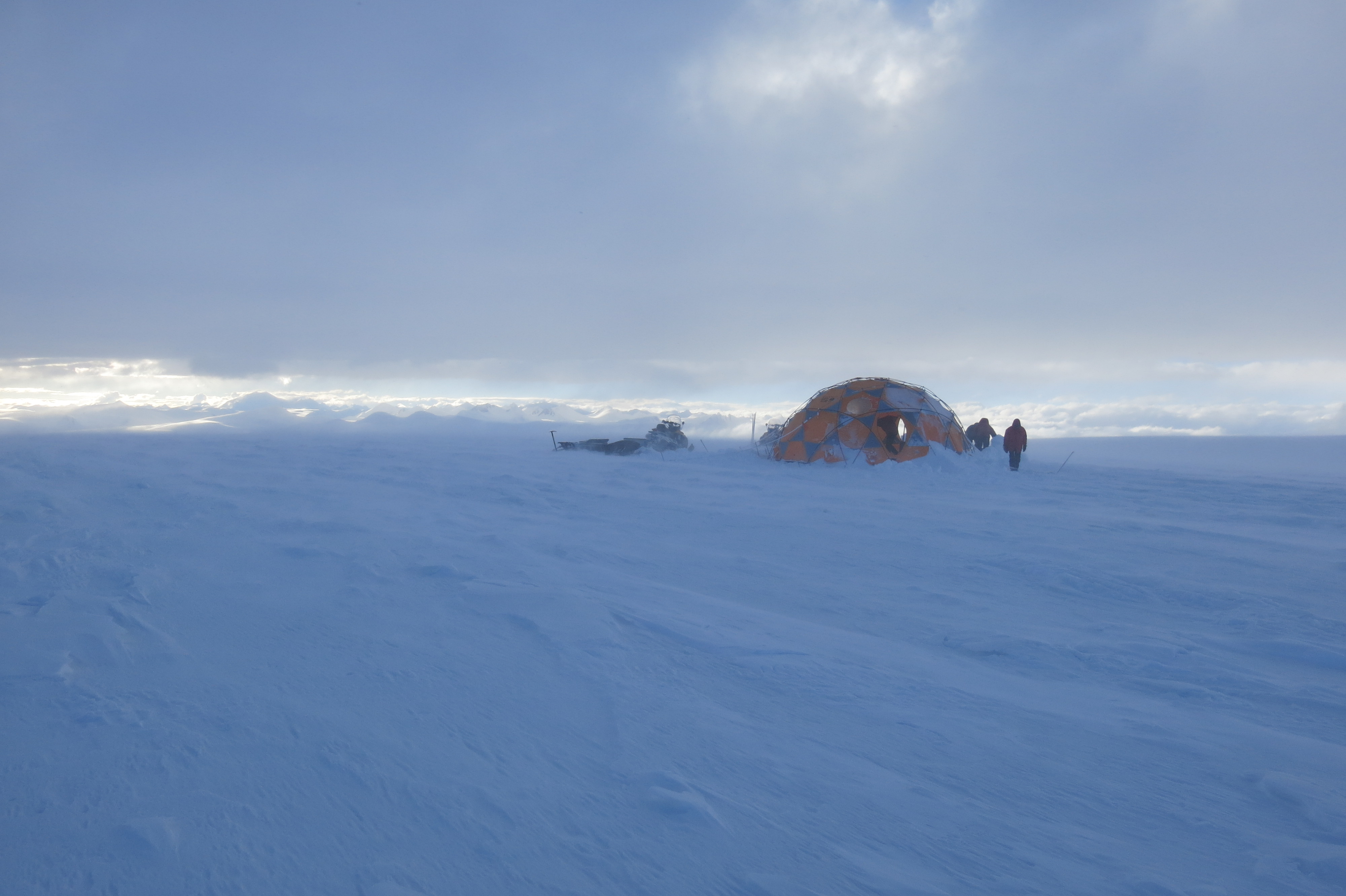Microbes, Bacteria, Viruses
Scientists Warn of an 'Unprecedented Risk' From Synthetic 'Mirror Life,' Built With a Reverse Version of Natural Proteins and Sugars
So-called mirror cells could rampage through our ecosystems, food supply and immune systems, experts say, potentially without existing barriers to protect against them
Fish Have a Brain Microbiome. Could Humans Have One Too?
The discovery that other vertebrates have healthy microbial brains is fueling questions about our own brains
A Giant Meteorite Ripped Up the Seafloor and Boiled Earth's Oceans 3.26 Billion Years Ago. Then, Life Blossomed in Its Wake
Geologists suggest the catastrophic impact of "S2" delivered key nutrients to the oceans, prompting microorganisms to thrive
Polar Bears Are Exposed to More Parasites, Viruses and Bacteria as the Arctic Heats Up
Pathogens are more common in polar bears living in the Chukchi Sea now than they were three decades ago, a new study suggests—but it's not yet clear what that means for the mammals' health
Mysterious Craters Discovered on the Bottom of Lake Michigan Could Hold Lessons About Early Life on Earth
Scientists aren't sure how the circular indentations some 450 feet below the surface formed, but they hope to investigate further
The World's Oldest Cheese Was Buried in a Chinese Tomb 3,600 Years Ago. Now, Scientists Have Sequenced Its DNA
New research has revealed that the mysterious white substance found alongside three ancient mummies was once a soft cheese called kefir
Scientists Have Found Bacteria and Fungi 10,000 Feet Up in the Air
The discovery has implications for human health, since the microbes included some that were still viable, some that could be infectious to humans and others that carried drug-resistant genes
Deaths From Antibiotic-Resistant Infections Could Reach 39 Million by 2050, Study Suggests
A new paper analyzes three decades of fatalities around the world and predicts how "superbugs" will affect human health in the future
Inside the Effort to Save Earth's Biocrusts
Think twice before stepping on that crunchy top layer of soil. It may be a vital ecosystem that you can help protect
Experts Discover 1,700 Ancient Viruses in a Tibetan Glacier
Studying how the viruses, which do not infect humans, adapted to previous major temperature shifts could hold clues to how modern viruses will react to the current climate change
Inside the Hidden Kingdom of Viruses in Your Gut
Human innards are teeming with viruses that infect bacteria. Here's what scientists are learning about them
WHO Declares Mpox Global Health Emergency. Here's What to Know
A new virus strain has been spreading primarily the Democratic Republic of the Congo, as well as nearby countries that had previously not reported mpox cases
Scientists Drill Deeper Into Earth's Mantle Than Ever Before, Probing for the Origin of Life on Earth
The record-setting rock samples will provide insight into the chemical processes that may have kick-started life on our planet
Your Microwave Is Teeming With Bacteria, Study Suggests
Researchers found thriving communities of microbes in microwave ovens used in home kitchens, shared spaces and laboratories
When Vultures Nearly Disappeared in India, Half a Million People Died, Too, Study Finds
By being nature's clean-up crew, the often maligned birds help prevent the spread of diseases, according to a new study
How Will Climate Change Hurt Lesser Flamingos?
Their food supply in East African lakes could collapse as rains increase
Paris Mayor Takes a Dip in the Seine Ahead of the Summer Olympics
The city spent $1.5 billion to improve water quality in the river, where several Olympic events are scheduled to take place
Gut Microbes Could Help Diagnose Autism, Study Suggests
While more research is needed, scientists detected specific differences between the gut microbiomes of children with and without autism
Meet the Forgotten Woman Who Revolutionized Microbiology With a Simple Kitchen Staple
Fanny Angelina Hesse introduced agar to the life sciences in 1881. A trove of unpublished family papers sheds new light on her many accomplishments
Man Infected With H5N2 Bird Flu in Mexico Dies. Here's the Latest on the Virus
The strain is not the same one that has infected U.S. cows and three dairy farm workers, and officials say the risk to the general public remains low
Page 1 of 18
:focal(2850x1900:2851x1901)/https://tf-cmsv2-smithsonianmag-media.s3.amazonaws.com/filer_public/48/cd/48cd8c49-1f65-489c-909c-2d128448d16a/gettyimages-1703790414.jpg)
:focal(960x722:961x723)/https://tf-cmsv2-smithsonianmag-media.s3.amazonaws.com/filer_public/e4/25/e4257109-554e-4580-8d94-e6c0ef14101d/fishbrainmicrobiome-crsamuelvelasco-lede-scaled.jpg)
:focal(2095x1181:2096x1182)/https://tf-cmsv2-smithsonianmag-media.s3.amazonaws.com/filer_public/a1/27/a1275ffc-8cd1-4f61-bcc7-9e966b295145/s2_impact_tsunami_bed_with_chunks_of_ripped_up_seafloor.jpg)
:focal(1228x970:1229x971)/https://tf-cmsv2-smithsonianmag-media.s3.amazonaws.com/filer_public/74/7a/747a5343-f684-49a1-b1af-f4a8e0a080b8/cover_photopolarbear_usgs.jpg)
:focal(720x542:721x543)/https://tf-cmsv2-smithsonianmag-media.s3.amazonaws.com/filer_public/4e/28/4e28d3b8-852e-4648-8e1e-fe81eb4839a1/456413832_487179584076657_4724674401960514023_n.jpg)
:focal(312x234:313x235)/https://tf-cmsv2-smithsonianmag-media.s3.amazonaws.com/filer_public/86/42/864283ec-b39e-46ca-87eb-c92bd9224f77/low-res_2_the_m25_dairy_sample.jpeg)
:focal(2144x1429:2145x1430)/https://tf-cmsv2-smithsonianmag-media.s3.amazonaws.com/filer_public/01/6c/016c624e-b949-422b-b17b-698523e35b65/flight_japan1.jpg)
:focal(1061x707:1062x708)/https://tf-cmsv2-smithsonianmag-media.s3.amazonaws.com/filer_public/8b/7f/8b7f8ad3-a9a5-4997-aa15-1d65c58bc450/gettyimages-1498980269.jpg)
:focal(800x602:801x603)/https://tf-cmsv2-smithsonianmag-media.s3.amazonaws.com/filer_public/e1/9a/e19a6fca-5146-432b-b1df-c76d74370ffc/cryptobiotic_soil_crust_in_natural_bridges_national_monument_near_sipapu_web.jpg)

:focal(800x602:801x603)/https://tf-cmsv2-smithsonianmag-media.s3.amazonaws.com/filer_public/46/02/46026cf0-fbc2-4552-aa5c-fb19a8430429/gettyimages-1333712258_web.jpg)
:focal(2550x2380:2551x2381)/https://tf-cmsv2-smithsonianmag-media.s3.amazonaws.com/filer_public/e6/e6/e6e66bde-35b4-4f98-b543-22e287229423/gettyimages-2163384921.jpg)
:focal(675x450:676x451)/https://tf-cmsv2-smithsonianmag-media.s3.amazonaws.com/filer_public/e3/cc/e3cc2297-470d-4623-96c3-f29359aa5fc6/sample_of_rock_earth_under_microscope.webp)
:focal(640x427:641x428)/https://tf-cmsv2-smithsonianmag-media.s3.amazonaws.com/filer_public/e7/f2/e7f24549-f508-4363-aab0-6eb2aa8a96c7/kitchen-7706307_1280.jpg)
:focal(3000x2000:3001x2001)/https://tf-cmsv2-smithsonianmag-media.s3.amazonaws.com/filer_public/f1/9d/f19dbd8f-ad20-496f-9665-07852d3bf051/gettyimages-1241170086.jpg)
:focal(672x506:673x507)/https://tf-cmsv2-smithsonianmag-media.s3.amazonaws.com/filer_public/a1/b8/a1b86622-2066-48a7-93a8-35b0220f4bce/davidharper1_web.jpg)
:focal(2500x1667:2501x1668)/https://tf-cmsv2-smithsonianmag-media.s3.amazonaws.com/filer_public/3a/9e/3a9e7421-9eb4-450a-af90-ca9080cd34f4/gettyimages-2161798185.jpg)
:focal(2736x1824:2737x1825)/https://tf-cmsv2-smithsonianmag-media.s3.amazonaws.com/filer_public/7c/26/7c269289-e6e1-4c75-b388-1141615f94af/gettyimages-1895741978.jpg)
:focal(700x527:701x528)/https://tf-cmsv2-smithsonianmag-media.s3.amazonaws.com/filer_public/eb/e4/ebe4e883-241d-40cc-b92b-3a96ce2fb152/hesse.jpg)
:focal(2404x1614:2405x1615)/https://tf-cmsv2-smithsonianmag-media.s3.amazonaws.com/filer_public/91/5e/915ee875-4026-4c7d-8dd9-ccf6252cd6a4/gettyimages-2155724410.jpg)